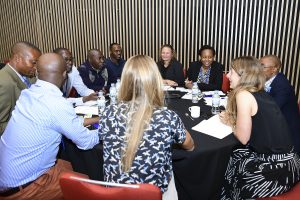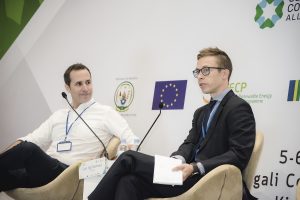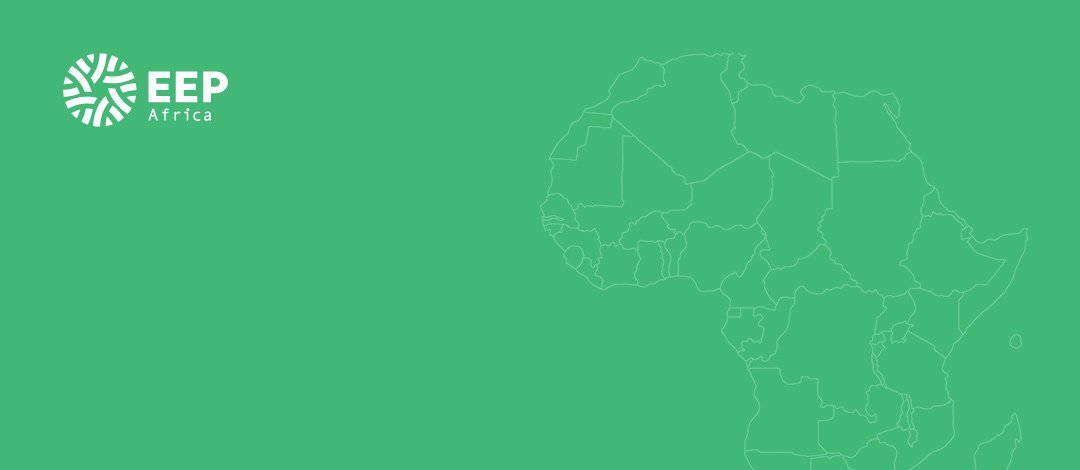The latest EEP Africa Knowledge Exchange Forum (KEF) capped off the Renewable Energy for Sustainable Growth – Rwanda Energy Week in Kigali. The event attracted over 120 specialists with lively discussions on mini-grids, private sector experiences and financing. Participants included project developers, equity and impact investors, researchers, and representatives of renewable energy associations, development banks, multilateral and bilateral organisations, and government institutions.
EEP Africa KEF’s are designed to enable experiences and learning to be shared across projects and to facilitate networking among EEP project developers and other players in the renewable energy sector. The KEF Kigali on 9 November 2018 was one of several special events held during Rwanda Energy Week, which was hosted by the Energy Private Developers (EPD). EEP Africa collaborates with local industry associations to increase its impact and was pleased to hold its KEF alongside events by EPD, GOGLA and the Clean Cooking Alliance.
The opening speakers emphasized current opportunities in the sector. Tom Rwahama, Energy Sector Secretariat Coordinator from the Rwanda Ministry of Infrastructure highlighted energy access as one of the government’s key priorities for economic growth. He shared Rwanda’s ambitious energy sector targets: by 2024, the government aims to provide universal energy access, with 48% of energy connections coming from off grid systems. Ivan Twagirashema the EPD chairman, highlighted the role of the private sector in fulfilling government targets by fostering investments that accelerate rapid electrification. Charles Wetherill, Program Manager of the EEP Africa Trust Fund at the Nordic Development Fund (NDF), emphasized the EEP portfolio’s value as a pipeline for downstream investors and a source of knowledge and learning on the broader policy and market environment.
The keynote speech was given by Chaim Motzen, founder of Izuba and co-founder/former managing director of Gigawatt Global, who shared his experience and lessons learned from the first IPP project in Rwanda, an 8.5 MW solar plant. He outlined key learning points in developing a project of this scale, such as working with a strong local partner and the need for government support.
 The main panel at KEF Kigali focused on Mini-Grids and included findings and insights from the recent EEP Africa in-depth study on mini-grids. A second panel on Attracting Financiers for Renewable Energy Projects included both project developers and different types of investors. Project preparedness and risk versus innovation were cited as some of the key factors in determining investment potential. Attendees were also able to discuss key issues more informally during Communities of Knowledge roundtables on: the role of industry associations; standardised KPIs; productive uses in mini-grids; women in value chains; and regional replication/local ownership.
The main panel at KEF Kigali focused on Mini-Grids and included findings and insights from the recent EEP Africa in-depth study on mini-grids. A second panel on Attracting Financiers for Renewable Energy Projects included both project developers and different types of investors. Project preparedness and risk versus innovation were cited as some of the key factors in determining investment potential. Attendees were also able to discuss key issues more informally during Communities of Knowledge roundtables on: the role of industry associations; standardised KPIs; productive uses in mini-grids; women in value chains; and regional replication/local ownership.
EEP Project of the Year 2018
Finally, the EEP Project of the Year 2018 was awarded during the KEF. This annual award highlights one EEP project for its outstanding innovation and success, offering public recognition that can attract investors and help advance the business to the next level of growth and sustainability. Shortlisted applicants, Meshpower (mini-grid developer in Rwanda) and Vitalite (SHS company from Zambia), presented their projects during the KEF and a panel of experts chose the winner based on the merits of the project. Lauri Tuomaala of EEP Africa announced Vitalite as the EEP Project of the Year 2018 for pioneering PAYG solar in Zambia. Wim Jonker Klunne of EEP Africa and Kelly Easton Programme Director for Africa Utility Week (AUW) jointly presented the award to Mike Matokwani, Finance Director of Vitalite. By combining quality products with an innovative approach to staff development and community engagement, Vitalite has experienced impressive growth in recent years. As part of the award, a representative of Vitalite is invited to speak at the 2019 AUW in Cape Town, South Africa.
The KEF Kigali was a dynamic event of knowledge sharing and networking. Upcoming EEP Africa events include an East Africa Investor Forum in Nairobi in December 2018 and a new Call for Proposals (CfP15) in 2019.
EEP Africa at the Clean Cooking Investment Forum in Rwanda
EEP participated in the first-ever Clean Cooking Investment Forum on 6 November in Kigali. The event convened more than 250 business leaders, investors, donors, and government representatives from over 40 countries to collaborate on the development of a global and sustainable clean cooking industry at scale.
The event was co-hosted by the Clean Cooking Alliance  and Energy Private Developers Rwanda. Several EEP supported project developers were featured on panel discussions including Burn, Inyenyeri, Simgas, Envirofit and Practical Action. The event highlighted the demand for growth in this sector to support the SDGs and the need for significant further investment.
and Energy Private Developers Rwanda. Several EEP supported project developers were featured on panel discussions including Burn, Inyenyeri, Simgas, Envirofit and Practical Action. The event highlighted the demand for growth in this sector to support the SDGs and the need for significant further investment.
The EEP Africa Head of Portfolio and Finance, Lauri Tuomaala, was a panelist on “Market Developer Perspective” and shared key market insights from the latest EEP call for proposals organized in 2018. Based on market intelligence from the call, the clean cooking industry is developing rapidly. New business models and innovations are being introduced, and significant lessons are being deployed from the SHS market. The Kigali event on investment highlighted the same market transformation observed by EEP.
EEP aims to continue developing the clean cooking sector and to support project developers in this sector in the 15 Southern and East African countries covered by EEP.
Unlocking Solar Capital Africa
EEP Africa also participated in the 3rd Unlocking Solar Capital Africa hosted by Solarplaza and GOGLA during Rwandan Energy Week. EEP Africa M&E Adviser, Anise Sacranie, attended the event along with over 350 representatives of development banks, investment funds, solar developers, IPPs, EPCs & other stakeholders. GOGLA shared its efforts to develop impact metrics and key performance indicators for the PAYG business model in collaboration with Lighting Global. The event also highlighted the challenges of accessing financing as one of the main barriers to exploiting the significant solar potential in Africa. This was particularly evident by the disparity between the number of financiers and project developers in the room. EEP Africa spoke with many of the investors present about how the Fund can support financing initiatives through its upcoming Investor Forum and other activities.



